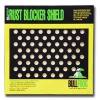I don't believe it is the moisture inside that causes the safe to be fireproof. It is the proper constuction using the right materials that give the safe its ability to reflect the heat away.
This depends on the type of safe construction you're speaking of. If the safe is a composite type safe, then you are correct. However, the vast majority of fire rated safes use a liquid gypsum based insulation. Composite safes are usually burglary rated, and are much more costly to build.
When the UL conducts their fire ratings, there are three major factors built into the test. The first is the temperature rise, the second is 30 foot fall to resemble a floor collapse, and the third is an internal explosion caused by the build up of steam. This steam is generated from those moisture rich insulations as it cooks off in a fire.
A 'fireresistant' safe is considered properly rated if the internal temperature doesn't reach above 350 degrees within the specified time that its rated for.
A fire resistant safe is only considered rated if it is rated by a recognized testing agency. In the US, the Underwriters Labs are the only ones with that type of credential. Foreign testing groups in Europe, Japan, and Korea are also recognized.
Independant testing facilities, such as those that test gun safes, are not recognized. They are not recognized because their standards of testing do not prove any real protection.
Moisture has nothing to do with its fire resistant abilities.
I'll tell you where I get my information, if you share with me where you got yours.

I am not trying to be disrespectful, but I also don't like to see stuff misrepresented
Neither do I. This is why I try to answer the safe questions when I see them pop up from time to time. People who know the answers to these questions are the guys like me, not the guys at the sporting goods or office supply store.



